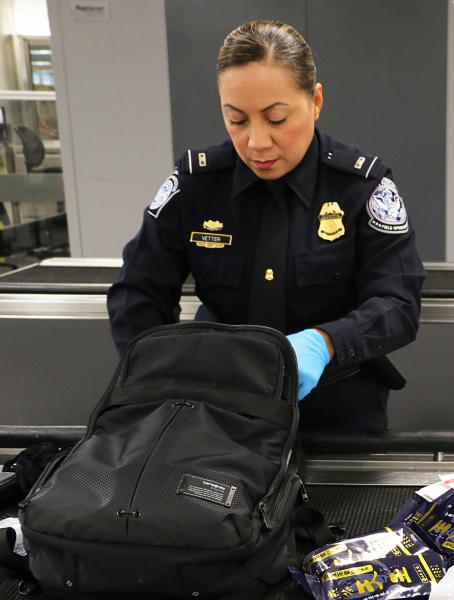STERLING, Virginia — U.S. Customs and Border Protection (CBP) recently issued travel tips for international travel through Washington Dulles International Airport. Chiefly among those tips is for travelers to truthfully report all currency they possess to a CBP officer during inspection.
A traveler leaving for Ghana Wednesday learned that lesson when CBP officers seized $15,415 of unreported currency he had in his possession.

backpack. (CBP File Photo)
While working a departure gate at Dulles airport, a CBP currency detector dog alerted to a carry-on bag that a U.S. citizen man carried. Officers explained the currency reporting requirements to the man and the man reported verbally and in writing that he possessed $8,000. An examination revealed that the man possessed $15,415. Officers seized the currency and returned $115 to the man as a humanitarian release, and then released the traveler.
It is perfectly legal to carry large sums of currency in or out of the United States. However, federal law requires that travelers who possess $10,000 or more in currency or other monetary instruments must report it all to a CBP officer at the airport, seaport, or land border crossing when entering or leaving the country.
“Customs and Border Protection officers know that concealed bulk currency is oftentimes proceeds from alleged illicit activity and it may be used to fund transnational criminal organizations,” said Casey Durst, CBP’s Field Operations Director in Baltimore. “CBP remains committed to enforcing all of our nation’s laws, including federal currency reporting laws, at our nation’s international ports of entry.”
Consequences for violating U.S. currency reporting laws are severe; penalties may include seizure of most or all of the traveler’s currency, and potential criminal charges.
CBP uses a variety of techniques to intercept narcotics, unreported currency, weapons, counterfeit consumer goods, prohibited agriculture, and other illicit products, and to assure that global tourism remains safe and strong. On a typical day, CBP seizes an average of about $290,000 in unreported or illicit currency along our nation’s borders. Learn more about what CBP accomplishes during "A Typical Day."
Travelers are encouraged to visit CBP’s Travel website to learn more about the CBP admissions process and rules governing travel to and from the U.S.
CBP's border security mission is led at ports of entry by CBP officers from the Office of Field Operations. Please visit CBP Ports of Entry to learn more about how CBP’s Office of Field Operations secures our nation’s borders.
Learn more about CBP at CBP.gov.

